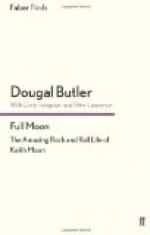As he contemplated the manifold perplexities of the case, Barrant tried to shut out the more sinister inference of the letter by asking himself, if after all, the postscript was not capable of some entirely innocent interpretation. But his conscientious mind refused to permit him to evade responsibility in that way. The letter could not be dismissed with a wave of one’s wishing wand. It remained stubbornly in Barrant’s perspective, an unexplained factor which could be neither overlooked nor ignored.
These thoughts ran through his mind as Mr. Brimsdown talked of his dead client. At the same time, the detective’s attitude towards the lawyer underwent a considerable change. His professional caution, amounting almost to suspicion, became modified by the more perceptive point of view that as the dead man had turned to Mr. Brimsdown for assistance, it would be better for him to trust the lawyer also—to look upon him as an ally, and make common cause with him in the search for Robert Turold’s murderer.
This changed attitude, carrying with it a seeming friendliness, the establishment, as it were, of an understanding between them, was not lost upon Mr. Brimsdown. But it had its awkward side for him, by giving added weight to the responsibility of deciding whether he should reveal or withhold his chance encounter with Sisily at Paddington. Till then, Mr. Brimsdown had been unable to make up his mind about that. There were some nice points involved in the decision. In an effort to reach a solution he broached the subject.
“Is it still your opinion that Miss Turold is guilty—after this letter?” he asked.
“Her disappearance lays upon her the obligation of explaining her secret visit to her father on the night of the murder,” was the guarded reply.
“Then you intend to arrest her?”
“Yes.”
“Do you know where she is?”
A quick consideration of this question led Barrant to the conclusion that it would do no harm to let the lawyer know the scanty truth.
“She is in London. I have traced her to Paddington.”
Mr. Brimsdown decided that, as the detective knew that much, it absolved him from any obligation to betray the daughter of his dead client. His feeling of relief unsealed his lips, and led him into an indiscretion.
“It seems incredible that she can be guilty.” As he spoke the memory of Sisily’s tender and wistful face, as he had seen it that night, came back to him.
“She had some justification, you know, if she was listening at the door that afternoon,” replied Barrant thoughtfully.
“It is hardly possible that she could have inflicted those marks on the arm,” Mr. Brimsdown said.
“How did you learn of them?” asked the detective quickly, in a changed tone.
Too late Mr. Brimsdown realized that in contrast to his silence with Charles Turold, he had now gone to the other extreme and said too much. He hesitated, but his hesitation was useless before the swiftness of Barrant’s deduction.




